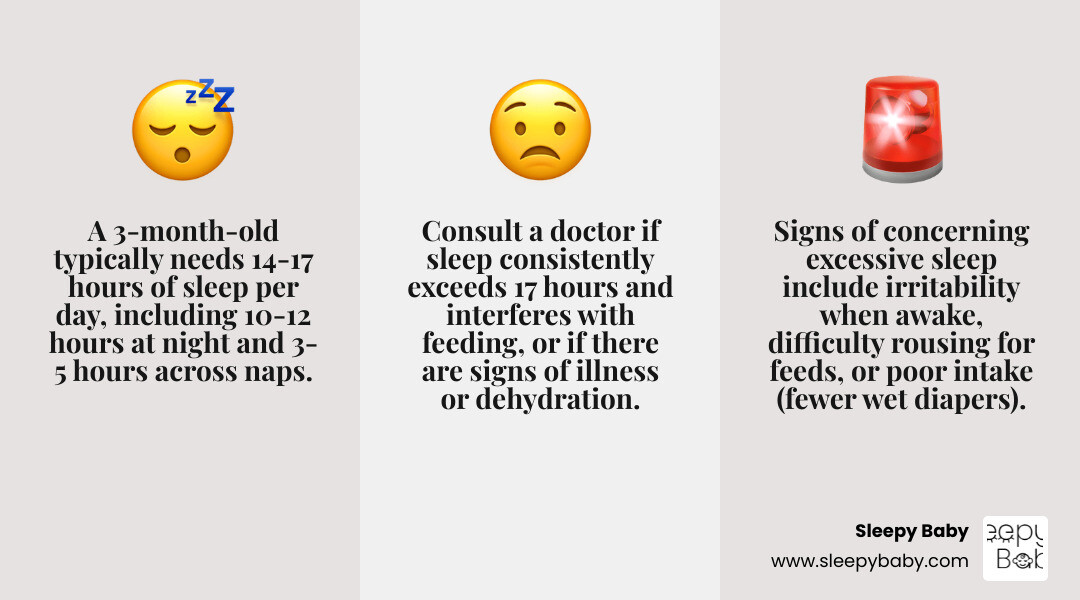Introduction: The Sleepy Baby Paradox
If you're noticing your 3 month old sleeping a lot, you're likely wondering if this is normal. Many parents dream of a baby who sleeps soundly, but when your little one seems to be snoozing more than usual, it can spark concern.
Here’s a quick look at what’s typical and when to pay closer attention:
- How much sleep is normal? A 3-month-old typically needs 14 to 17 hours of sleep in a 24-hour period. This usually breaks down into 10-12 hours at night and 3-5 hours across several naps.
- What does "sleeping too much" mean? This might mean your baby is irritable when awake, difficult to rouse for feedings, or showing signs of poor feeding (like fewer wet diapers or slow weight gain).
- When should you be concerned? If your baby consistently sleeps over 17 hours a day, it interferes with feedings, or they show signs of illness (like fever) or dehydration.
This guide will help you understand typical sleep patterns for 3-month-olds and when increased sleep is a normal part of their development.
This guide comes from Gary Harutyunyan, founder of Sleepy Baby. Having steered the challenges of a newborn's sleep, Gary founded Sleepy Baby to provide innovative solutions for parents, including understanding why a 3 month old sleeping a lot can be both a blessing and a worry.

How Much Sleep Does a 3-Month-Old Actually Need?
For a 3-month-old, the general guideline is a total of 14 to 17 hours of sleep in a 24-hour period. This isn't a strict rule; some babies need a little more or less. The key is to observe how your baby behaves when they are awake.
This total sleep usually breaks down into 10 to 12 hours at night (often still broken by a few feeds) and three to five naps totaling 3 to 5 hours during the day. Wake windows—the time your baby is awake between naps—are also crucial. For a 3-month-old, these typically last 60 to 120 minutes. This is the sweet spot for feeding, playing, and interacting without becoming overtired, which can surprisingly make it harder for them to sleep.
Around 3 to 4 months, your baby's sleep cycles start to mature and become more like an adult's. This can sometimes lead to a temporary "sleep regression" as their body adapts to these new patterns. For an even deeper dive into typical sleep behavior for babies around this age, you might find this resource helpful: Typical sleep behaviour for 3-6 month olds.
To give you a clearer idea of how sleep needs evolve, here's a quick comparison:
| Sleep Need/Pattern | Newborn (0-3 Months) | 3-Month-Old |
|---|---|---|
| Total Sleep (24 hrs) | 14-19 hours (highly variable) | 14-17 hours (more consistent) |
| Nighttime Sleep | 8-9 hours (very broken, frequent feeds) | 10-12 hours (longer stretches, still 2-3 feeds common) |
| Daytime Naps | 8-9 hours (irregular, frequent short naps) | 3-5 hours (3-5 naps, some longer) |
| Wake Windows | 45-90 minutes | 60-120 minutes |
| Sleep Cycles | Shorter, less organized, mostly REM sleep | Maturing, more organized, resembling adult cycles (90-120 mins) |
| Feeding Frequency | Every 2-3 hours (often needing to be woken for feeds) | Every 3-4 hours (some self-waking, some still need waking) |
| Day/Night Distinction | Little to none | Starting to emerge, more nighttime sleep consolidation |
Understanding Sleep Patterns and When It's "Too Much"
At 3 months, you'll notice a gradual consolidation of sleep, meaning longer stretches at night. While some babies might sleep for 6 to 8 hours straight, waking for one or two night feeds is still perfectly normal. Their internal body clock (circadian rhythm) is maturing, helping them distinguish between day and night.
So, can a baby sleep "too much"? The answer isn't just about the total hours. It's about the quality of their wake time. If your baby sleeps a lot but is happy, alert, and feeds well when awake, their sleep is likely normal. They might just be a good sleeper or going through a growth spurt.
However, if increased sleep is paired with lethargy, difficulty waking (even for feeds!), or poor feeding (fewer wet diapers), it's time to pay closer attention. As a parent, you are the expert on your baby. If your gut tells you something is off, trust that instinct.
We dive deeper into how sleep patterns evolve in our guide: The Sleep Journey: Infant Sleep Patterns in the First Year.
Why Your 3 Month Old is Sleeping a Lot: Common (and Normal!) Reasons
If your 3 month old is sleeping a lot, it's often a completely normal sign of their development. Here are some of the most common reasons for extra snoozing.

Growth Spurts
Rapid growth takes a lot of energy. Important growth hormones are released during sleep, making extra rest essential for building muscle and bone. During a growth spurt, you might also notice an increased appetite as your baby fuels up. If your baby is eating more and sleeping more, it's a strong sign of a healthy growth period. For more on what to expect, see guides like When Do Baby Growth Spurts Happen? and Mama Natural on growth spurts.
Post-Vaccination Snoozes
It's very common for babies to be extra sleepy after vaccinations. Their immune system is working hard to build protection, which is like a workout for their body. You might also see a mild fever or fussiness. Allowing them to rest helps their body recover and integrate the vaccine's benefits. We recommend following the official vaccination schedule, such as the one from the CDC. For more on post-vaccine sleep, Mother Together offers helpful perspectives.
Developmental Leaps
At 3 months, your baby is learning at an incredible pace—becoming more social, cooing, reaching for toys, or even trying to roll over. This intense brain development is tiring. Sleep helps their brain process and consolidate everything they've learned. If your 3 month old is sleeping a lot while also showing off new skills, it's likely a sign of healthy progress. We explore this in our guide: From Chaos to Calm: Mastering Your 3 Month Old's Daily Routine.
Fighting Off a Minor Illness
Like adults, babies need extra rest when fighting off a bug like a common cold or teething discomfort. Their immune system is working overtime, and sleep is the body's natural recovery tool. If you notice other symptoms like a runny nose or cough, extra sleep is usually beneficial. However, keep a close eye on them and ensure they stay hydrated.
When to Call the Doctor: Red Flags to Watch For
While a 3 month old sleeping a lot is often normal, increased sleepiness can sometimes be a red flag. Trust your parental intuition—if something feels off, it's always best to seek professional advice from your pediatrician.

Key Concerns That Warrant a Doctor's Call
Pay close attention if excessive sleep is accompanied by any of the following signs.
Poor Feeding and Dehydration:
- Consistently missing multiple feeds or being too sleepy to eat.
- Fewer than 5-6 wet diapers in 24 hours.
- Crying with no tears, a dry mouth, or a sunken soft spot (fontanelle).
- Lack of appropriate weight gain (monitored by your pediatrician).
Lethargy and Other Warning Signs:
- Extreme difficulty waking your baby, even for feeds.
- Appearing unusually limp, listless, or "floppy" when awake.
- A significant change from their usual behavior, such as being withdrawn or unresponsive.
- A high fever (over 100.4°F or 38°C rectally) or an abnormally low temperature.
- Any breathing difficulties, such as gasping, wheezing, flaring nostrils, or the skin sinking around their ribs (retractions).
- Signs of jaundice (yellowing of the skin or eyes).
In summary, if your baby is sleeping more than 17-18 hours a day and it interferes with feeding, or if you notice any of the red flags listed above, contact your doctor without delay.
Your Guide to Healthy Sleep Habits and Routines
Establishing healthy sleep habits early is a gift to your whole family. A positive sleep environment and routine can help guide your baby toward more restful nights and days.

Establishing a Day-Night Rhythm
Help your baby’s internal clock (circadian rhythm) mature by creating clear day and night cues.
- Daytime: Expose your baby to bright, natural light and encourage active play and interaction.
- Evening: Dim the lights and switch to quiet activities like a warm bath, gentle massage, or reading a book to signal that it's time to wind down.
- Night Feeds: Keep night feeds "boring"—use low light, speak softly, and avoid stimulating play.
For more tips, see our guide: Goodnight, Sleep Tight: Bedtime Routines for Your 3 Month Old.
Soothing Techniques and Sleep Aids
Finding what soothes your baby is a unique journey.
- Swaddling Transition: If your baby shows signs of rolling, it's time to stop swaddling for safety. Transition to a sleep sack that allows their arms to be free.
- White Noise & Rhythmic Patting: While some white noise machines can be unsafe, modern safety-rated devices exist that provide sound at safe, low-decibel levels. Rhythmic patting devices, like those from Sleepy Baby, can mimic a caregiver's comforting touch to provide hands-free soothing. This gentle, effective method helps babies settle and promotes independent sleep. Learn more here: The Gentle Dreamer: Your Solution for Fussy and Colic Babies with the Ultimate Baby Patting Device.
- Pacifiers: A pacifier can offer comfort and may help reduce the risk of SIDS.
The 'Dream Feed' and Ensuring Adequate Nutrition
A "dream feed" is a feeding offered to your baby while they are mostly asleep, typically between 10 PM and midnight, right before you go to bed. The goal is to top up their tummy to encourage a longer stretch of sleep. The Pediatric Sleep Council offers more insight on this.
If your 3 month old sleeping a lot has you worried about their food intake, it's crucial to ensure they get enough nutrition. You may need to gently wake your baby for feeds if they regularly sleep longer than 4-5 hours and miss feedings, especially if there are weight gain concerns. Monitor for early hunger cues (rooting, lip smacking) and track wet/dirty diapers. If you have concerns about your baby's intake, always consult your pediatrician or a lactation consultant.
Frequently Asked Questions about Your 3-Month-Old's Sleep
When your 3 month old sleeping a lot becomes a new pattern, it's natural to have questions. Here are some common ones.
Should I wake my 3-month-old from a nap?
Generally, it's best to let a sleeping baby sleep, especially if they are growing well and seem happy when awake. However, you should consider gently waking them in two situations:
- To protect feedings: If long naps cause your baby to miss multiple feeds and you have concerns about their calorie intake or weight gain.
- To protect nighttime sleep: If a very long late-afternoon nap pushes bedtime too late or seems to disrupt their night. Capping a single nap at around two hours can sometimes help.
Could my 3-month-old be going through a sleep regression?
Yes. While the "4-month sleep regression" is more famous, the significant changes in sleep patterns can start around 3 months. This isn't truly a "regression" but a "progression" where their sleep cycles mature to be more like an adult's. This means more time in lighter sleep and brief awakenings between cycles. For some babies, this leads to more frequent waking, while for others, it can lead to longer, more consolidated sleep. Consistency in your routine is the best way to support them through this phase.
How can I take care of myself during these changes?
Navigating your baby’s changing sleep patterns can be draining. Prioritizing your own well-being is essential.
- Rest When Baby Rests: Resist the urge to do chores and use naptime to recharge yourself.
- Ask for Help: Lean on your partner, family, or friends. Ask them to watch the baby so you can get a break.
- Prioritize Your Sleep: Go to bed earlier or take turns with your partner for night wakings to maximize your own rest.
- Connect with Other Parents: Sharing experiences can be incredibly validating and comforting.
- Give Yourself Grace: This phase is temporary. You are doing an amazing job, even on challenging days.
From Worry to Well-Rested: Your Takeaway
Parenthood is a beautiful, wild ride, and when your 3 month old sleeping a lot becomes a new pattern, it's completely natural to feel a mix of relief (finally, some quiet!) and a tiny flutter of concern. We've explored together how sleep patterns for little ones are constantly evolving, and how often, this extra snoozing is a perfectly normal, healthy sign of their incredible development – think growth spurts, post-vaccination recovery, or those amazing developmental leaps!
But beyond the "why," what's the big picture? A 3-month-old typically thrives on 14-17 hours of sleep within a 24-hour period, often with longer stretches at night and good, solid naps during the day. The most important thing to watch isn't just the clock, but the quality of their wake time. If your baby is bright-eyed, happy, engaging with you, feeding well, and producing plenty of wet and dirty diapers when they are awake, then that increased sleep is likely just their body doing its important work.
However, your intuition is your superpower. While extra sleep is often a good sign, stay vigilant. Keep an eye out for any red flags that might suggest something more is going on, such as signs of dehydration (like fewer wet diapers or dry mouth), extreme lethargy, a lack of interest in feeding, or a persistent high fever. If any of these concerns pop up, or if your gut tells you something isn't quite right, please don't hesitate to reach out to your pediatrician. It's always, always better to be safe and get professional advice.
And while your little one is navigating their sleep journey, you're on one too! Establishing healthy habits like a clear day-night rhythm, using gentle soothing techniques, and even considering strategies like a dream feed, can truly make a difference for everyone's rest. But most importantly, please prioritize self-care. This phase of rapid change is demanding, and you can't pour from an empty cup. Snatch rest when you can, ask for help, and give yourself so much grace. You are doing an incredible job.
At Sleepy Baby, our commitment is to support you on this wonderful, sometimes weary, journey. We understand the desire for truly restful nights, both for your baby and for you. That's why we create portable, intelligent sleep aids, designed to mimic a caregiver's comforting touch. With features like rhythmic patting and safe, low-decibel white noise, our devices offer hands-free, customizable soothing, striving to help promote better, independent sleep for your little one. This allows you to catch those much-needed Z's too, knowing your baby is safe and soothed.
We hope this guide has brought you clarity, reassurance, and perhaps a little more peace of mind. Keep trusting your instincts, you've got this!




